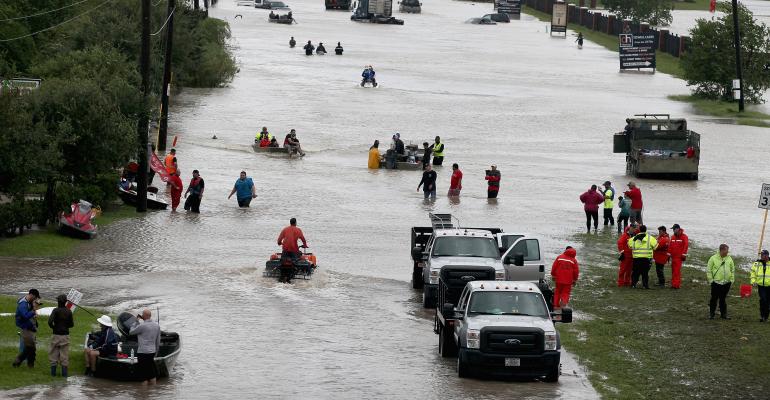The city will focus on debris removal where area haulers work to restore services.

Hurricane Harvey has passed and recovery efforts are underway. For the waste industry, the Houston Solid Waste Management Department is suspending some services in order to focus on public health issues. Meanwhile companies like Waste Management are working to restore operations.
The industry’s initial reaction to the storm was a forced suspension of operations throughout the region. Companies with large footprints in the area, such as Waste Management, Waste Connections, WCA Waste Corp. and others focused first on accounting for employees and making sure conditions were safe enough before resuming operations.
Waste Management sent several tweets yesterday documenting its recovery efforts and return to operations:
Our #houston recycling facilities are back up and running as of Aug 31. For up-to-date info on service and sites, https://t.co/qhNYzOeLbj pic.twitter.com/SL6v68rY7Z
— WM_TEXOMA (@WM_Texoma) August 31, 2017
We’ve started recovery efforts. Hear from our CEO Jim Fish on the next steps. https://t.co/dYshrINkJd pic.twitter.com/DTVqcRVy5K
— Waste Management (@WasteManagement) September 1, 2017
Mayor @SylvesterTurner acknowledges WM & CEO Jim Fish for our $1.5M cash contribution to the City & County to help with hurricane relief. pic.twitter.com/DVtVQGHg2t
— Waste Management (@WasteManagement) August 31, 2017
We're on the road. See you soon, Houston. pic.twitter.com/0U0D4dC8ES
— Waste Management (@WasteManagement) August 31, 2017
Republic Services posted a blog on its approach to the storm as well.
Seeing our people come together to support the community and care for each other is what makes @RepublicService so strong #HoustonStrong pic.twitter.com/48ldhbxR5p
— Randy Goldberg (@rgoldberg) September 1, 2017
In a disaster like #Harvey2017, our first priority is our people. Read why: https://t.co/wN4CltZ4lJ. pic.twitter.com/Qgrrh0ZZYN
— Republic Services (@RepublicService) August 30, 2017
The Houston Solid Waste Management Department said disaster debris from Hurricane Harvey will be collected on a seven-day schedule until all material has been collected., according to Click2Houston.com.
Meanwhile, Wastebits, a waste management technology solutions company, is enabling free access to its proprietary collaborative software platform to help with the coordination of recovery and cleanup efforts in and around the areas affected by the storm.
Effective immediately, Wastebits is providing free access to all posting and communication tools on its vendor portal for waste vendors, waste brokers, waste transporters, emergency response companies and suppliers of containers, absorbents, and other equipment through the end of the year. The goal of this effort is to quickly and easily facilitate communications between groups affected by Hurricane Harvey that need clean-up and waste removal services.
The Wastebits homepage will feature a special Hurricane Harvey section with links directing visitors to either select “I’m a Company that Accepts/Transports Debris” for vendors involved in the disposal of waste or “I Need to Dispose of Hurricane Debris” for those needing to dispose of waste. Wastebits is also asking all current clients listed on its portal to login as soon as possible or by September 8, 2017 to update their company’s information, type(s) of waste accepted or managed, services or equipment provided, geography coverage and schedule for hours of operation.
“The damage resulting from Hurricane Harvey is only beginning to be seen, but there is already an immediate need for access to resources to help businesses and the communities impacted,” Wastebits President and CEO Dan Collins said in a statement. “A critical part of the cleanup will be coordination and speed to minimize further devastation. The waste disposal industry has an opportunity to take a leadership position in aiding this effort. We are proud to do what we can by providing access to this information that will hopefully expedite the process.”
In addition, emergency response expert and provider of environmental and regulated waste management solutions Stericycle Environmental Solutions has listed some recommentations for those in the Houston area:
Do not walk in the floodwater if there are dry areas that you can travel on instead. It may seem like common sense, but walking on dry land will help you avoid exposure to hazardous chemicals and materials that may be in the floodwater.
If you’re still in your home but may be at risk of flooding, put items like bleach and your cleaning supplies on a high shelf in a secured area. These common household items contain hazardous materials that can contaminate your home and the surrounding area if spilled. Make sure all nozzles and lids are secured shut on these items.
Retailers will need to take steps to clean up any spilled hazardous waste items before they can safely re-open to the public. Flooded retail stores means products, some of which may contain hazardous materials that must be disposed of properly, are damaged and deemed unsellable or unsalvageable. These products must be segregated according to waste stream and disposed of in compliance with local, state and federal regulations.
Michael Hoffman, managing director of environmental services research at Stifel, also provided an update on the long-term affects of the hurricane, stating, "Hurricane Harvey will have initial costs associated with it—more leachate, bringing in extra employees to help fill in for local employees impacted by the storm—but the storm debris/cleanup should more than compensate for those costs looking out one or two periods. Some of the immediate debris clearing is big volume, quickly, and then there is the long-tailed deconstruction/reconstruction process to follow. All the wet wallboard (a 4x12 sheet is 50lbs. to 70lbs.) and carpet/flooring has to come out of buildings quickly to control the spread of mold—this is the deep south and its still summer. The insurance claim process has its own life-cycle but this is not the insurance industry's first disaster rodeo either."
About the Author(s)
You May Also Like


